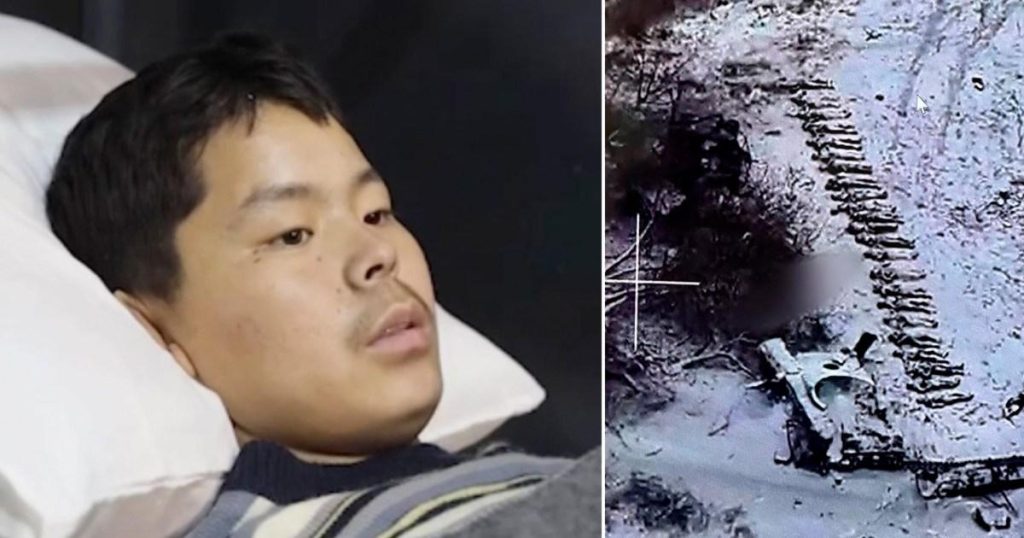The Untold Story of North Korean Soldiers in the Ukraine War: Unveiling Coercion, Deception, and Sacrifice
The ongoing conflict in Ukraine has unveiled a complex web of international involvement, with North Korea’s contribution adding a chilling layer to the narrative. Captured North Korean soldiers fighting alongside Russian forces have provided glimpses into a world of coercion, deception, and sacrifice, shedding light on the human cost of geopolitical maneuvering. One captured soldier’s testimony reveals a shocking lack of awareness regarding his deployment to Ukraine. Unaware of his destination or the enemy he would face, this soldier, along with hundreds of his compatriots, was transported to Russia under false pretenses, highlighting the exploitative nature of North Korea’s involvement in the conflict. The soldier’s account paints a grim picture of battlefield casualties and the overall confusion surrounding the North Korean contingent’s role in the war.
The captured soldier’s experience underscores a pattern of manipulation and misinformation employed by North Korean authorities to ensure compliance. The soldier’s lack of training on Russian military equipment, coupled with reports of other North Korean soldiers receiving such training, suggests a deliberate strategy of deploying some troops as expendable "cannon fodder" while reserving others for more specialized roles. This calculated approach minimizes Russian losses while maximizing the impact of North Korea’s contribution, raising serious ethical concerns about the treatment of these soldiers.
Further insights into the dire circumstances faced by North Korean soldiers in Ukraine come from intelligence reports and statements by high-ranking officials. South Korea’s intelligence agency (NIS) has reported that some North Korean soldiers were ordered to commit suicide rather than be captured, reflecting the extreme pressure and fear instilled in them. These reports, echoed by White House National Security Council spokesperson John Kirby, highlight the severe repercussions faced by captured soldiers and their families back home, adding another layer of tragedy to their plight.
The implications of North Korea’s involvement in the Ukraine conflict extend beyond the immediate battlefield. The deployment of North Korean troops raises concerns about the internationalization of the conflict and the potential for escalating tensions. The secrecy surrounding this deployment and the lack of transparency from North Korea complicate efforts to understand the full extent of the country’s involvement and its motivations. Furthermore, the reports of coercion and human rights abuses raise serious questions about the ethical implications of using soldiers as pawns in geopolitical games.
The captured soldier’s testimony, coupled with intelligence reports and official statements, paints a compelling picture of the human cost of the Ukraine war and the hidden toll on North Korean soldiers. Their stories expose a disturbing reality of deception, coercion, and sacrifice, shedding light on the often-overlooked human dimension of armed conflict. As the international community grapples with the complexities of the Ukraine crisis, it is imperative to acknowledge the plight of these soldiers and hold those responsible for their exploitation accountable.
The ongoing investigation into North Korea’s involvement in the Ukraine war promises to reveal more details about the extent of the country’s contribution and the circumstances surrounding the deployment of its troops. Ukrainian President Volodymyr Zelensky’s commitment to uncovering the full truth underscores the importance of transparency and accountability in addressing this sensitive issue. As more information comes to light, it is crucial to remember the human stories behind the headlines, recognizing the sacrifices and suffering of North Korean soldiers caught in the crossfire of geopolitical conflict. The international community must work towards ensuring that such exploitation is prevented in future conflicts and that the human rights of all soldiers are protected, regardless of their nationality or allegiances.


